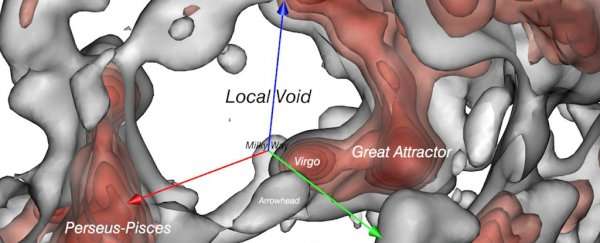Here’s the part where they explain the theoretical solution
Under Oppenheim’s theory, however, space-time wouldn’t just be smooth, it would become sort of wobbly and unpredictable.
Here’s where it becomes testable. This wobbliness would result in fluctuations of measurable properties that are larger than the fluctuations predicted by quantum theory.
With the right experiment, physicists could look for those fluctuations.
We have shown that if space-time doesn’t have a quantum nature, then there must be random fluctuations in the curvature of space-time which have a particular signature that can be verified experimentally," says physicist Zach Weller-Davies of University College London.
“In both quantum gravity and classical gravity, space-time must be undergoing violent and random fluctuations all around us, but on a scale which we haven’t yet been able to detect. But if space-time is classical, the fluctuations have to be larger than a certain scale, and this scale can be determined by another experiment where we test how long we can put a heavy atom in superposition of being in two different locations.”
I think they don’t really do a good job of explaining it, so if anyone here knows more about it, please share!
So basically they’re hoping that space doesnt act like literally everything else and hoping that avoiding having to reconcile the two (quantum physics and gravity) in the first place solves the problem.
Tbh I think this is a model based on optimism not what we observe.
On cooler news. We found out that our previous measurements on the acceleration of the universes expansion might have been entirely wrong
That is because the data could have been skewed by a rather recently discovered superstructure called the “Local Void” which the milky way galaxy itself borders to and has been obscured by our own galaxy. It’s very likely that the universe might not be expanding at an increasing speed after all of it turns out the “local void” skewed the data we have. We are in the middle of figuring THAT out!

Can the universe even expand faster than the “speed of light”? Not saying anyone is claiming that, just a thought I had.
Yes
Cool. I was hoping that would be the answer, so that I could ask, How do we know?
The universe expanding faster than the speed of light is the current theory, so there should be endless amounts of research to pursue if you would like to figure out how/why.
In layman’s terms, the actual matter of the universe is not “moving away from eachother” in the classical sense. The space in between said matter is growing/expanding, possibly due to “dark energy” which is just the word we give to describe the act of the universe expanding. So “dark energy” is just a placeholder until we figure out how/why, but that is what you should look more into if you want to find out more.
Kurzgesagt just did a video about gravity versus dark energy and how that will change the end of the universe. Pretty cool thought experiments.
We need a time period of inflation to explain our very homogeneous universe. Just read up on the wiki page about the inflationary epoch: https://en.wikipedia.org/wiki/Inflation_(cosmology)
Yes because new space can be made faster then light.
this seems a bit unfair. We have already seen space working differently from matter (speed of light). Its possible timespace is its own thing outside of matter.
- Velocity has to do with rest mass not matter/not matter
- This is again, speculation. There is zero evidence that space-time magically isn’t quantum like everything else. Not wanting to deal with the difficulties of merging quantum mechanics and relativity is not sufficient to necessitate claiming space-time isn’t subject to quantum physics. What we want the world to be isn’t the same as what it is. So yes space could be different than everything else but the burden of proof that this is so is on the person that claims this and right now, the only justification for it is that it’d be a really hard problem to solve if space is quantum. That’s it. There’s no basis for it from first principles.
regardless space can move faster than the speed of light but matter cannot. And mass is a property of matter. so if space is quantum like then it can break the speed of light. then again spooky action at a distance and all.







